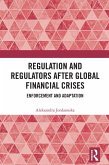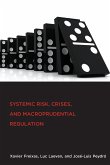The 2008 global financial crisis was a rude awakening for financial regulators. In its wake, a novel approach called "macroprudential policy" became an important pillar of financial regulation to ensure the stability of the financial system. But in the decade after the crisis, financial regulators in different countries implemented macroprudential policies that varied widely in their stringency. This is a worrying gap since uneven regulation across borders and different financial sectors was a key driver of the 2008 crisis. What explains these cross¿country, cross¿sectoral, and temporal variations in macroprudential policy? This book answers this question through an in¿depth comparative historical analysis of the banking and asset management sectors in the United States and Japan. By comparing two sectors of the financial industry in two diverse economies, we can observe consistent dynamics in the politics of regulatory reform that illuminate the causes of different policy stringencies. The subject matter of this book will appeal to researchers and students of finance, financial regulation, political economy, and the politics of regulation. Its theoretical and methodological underpinnings will be of interest to scholars of comparative politics, comparative sociology, historical institutionalism, and those interested in interview¿based qualitative methods.
Bitte wählen Sie Ihr Anliegen aus.
Rechnungen
Retourenschein anfordern
Bestellstatus
Storno








